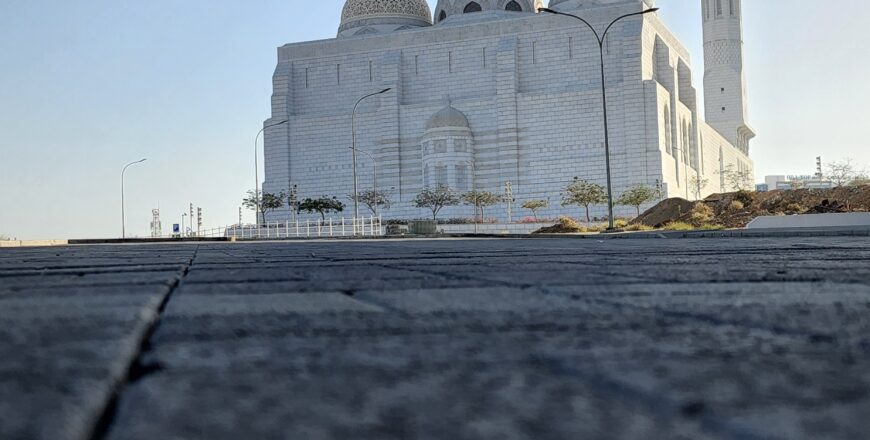What Are The 5 Pillars Of Islam
- Description
- Curriculum
- FAQ
- Announcement
- Reviews

-
1Lesson 1.1: Overview of the Five Pillars
Introduction to the Concept of the Five Pillars
The Five Pillars of Islam are fundamental acts of worship and the foundation of a Muslim’s life. They are more than rituals; they represent a Muslim’s commitment to faith and a framework for fulfilling one’s spiritual and social responsibilities. Just as pillars provide structural support to a building, the Five Pillars sustain a Muslim’s faith and create a strong foundation in their connection with Allah and the Muslim community.
-
2Lesson 1.2: Why the Five Pillars Are Essential for Every Muslim
The Spiritual, Moral, and Social Benefits of Following the Five Pillars
The Five Pillars of Islam serve as guiding principles, not only for personal worship but also for cultivating a positive, interconnected community. Understanding these pillars’ benefits helps Muslims see them as more than obligations—they are pathways to personal growth, spiritual enrichment, and social harmony.
-
3Lesson 2.1: Understanding the Shahada
Introduction to the Shahada
The Shahada, or Declaration of Faith, is the first and most fundamental of the Five Pillars of Islam. It is the phrase that every Muslim recites to profess their belief in the oneness of Allah and the prophethood of Muhammad (peace be upon him). The Shahada is not only the entry point into Islam but also a lifelong commitment to living by its principles. By declaring this testimony, Muslims affirm their devotion to Allah as the sole deity and Muhammad as His final messenger.
The Shahada states:
“Ashhadu alla ilaha illa Allah, wa ashhadu anna Muhammadur Rasul Allah.”
Translation:
“I bear witness that there is no god but Allah, and I bear witness that Muhammad is the Messenger of Allah.”
-
4Lesson 2.2: The Spiritual Meaning of Declaring Faith
Reflection on the Meaning Behind the Words of the Shahada
The Shahada, or Declaration of Faith, is a profound testament that shapes the core of a Muslim's identity. Each phrase within the Shahada embodies deep spiritual principles that impact a Muslim’s understanding of life, purpose, and relationship with Allah. The Shahada is more than a statement—it’s a commitment to living by the values it represents.
“Ashhadu alla ilaha illa Allah, wa ashhadu anna Muhammadur Rasul Allah.”
Translation: “I bear witness that there is no god but Allah, and I bear witness that Muhammad is the Messenger of Allah.”
-
5Lesson 3.1: The Purpose of Salah
The Spiritual Significance of Salah
Salah, the second pillar of Islam, is the obligatory daily prayer that allows Muslims to connect directly with Allah. It is more than a physical act; Salah is a profound spiritual practice that nurtures faith, builds discipline, and offers solace. Through prayer, Muslims find a unique opportunity to step away from the distractions of daily life, turn their hearts toward Allah, and experience a sense of tranquility and purpose.
Salah is performed five times a day—at dawn, noon, mid-afternoon, sunset, and evening—establishing a rhythm that keeps a Muslim’s focus on Allah throughout the day. These regular intervals provide a consistent reminder of one’s purpose and responsibility as a servant of Allah.
-
6Lesson 3.2: Learning the Steps of Salah
Understanding the Importance of Salah
Salah, or prayer, is the second pillar of Islam and an essential act of worship that Muslims perform five times a day. Each prayer includes specific physical movements and recitations that connect the worshipper to Allah, encourage mindfulness, and foster humility. Performing Salah with proper understanding and attentiveness allows Muslims to gain spiritual fulfillment, discipline, and closeness to Allah. This lesson provides a step-by-step guide to each movement and recitation in Salah, helping students learn how to perform it accurately and meaningfully.
-
7Lesson 3.3: Time Management for the 5 Daily Prayers
The Importance of Praying on Time
Performing Salah on time is essential to a Muslim's spiritual practice. Prayer times are set according to the sun’s position, marking different phases of the day with intentional pauses for worship and reflection. By organizing daily activities around these prayer times, Muslims maintain a continuous connection with Allah, helping them stay focused, disciplined, and spiritually fulfilled throughout the day.
However, balancing daily responsibilities—like work, school, and family commitments—can make it challenging to perform each Salah on time. This lesson provides practical tips for managing your schedule to prioritize prayer, allowing you to stay consistent in your worship and make the most of each Salah.
-
8Lesson 4.1: Understanding Zakat and Its Importance
Introduction to Zakat
Zakat, the third pillar of Islam, is the mandatory act of charity required of all Muslims who are financially able. The word "Zakat" in Arabic means “purification” or “growth,” indicating that by giving a portion of one’s wealth to those in need, a Muslim purifies their own wealth and allows it to grow in spiritual value. Through this act, Muslims contribute to the welfare of society, reduce inequality, and express gratitude for Allah’s blessings.
Unlike voluntary charity (sadaqah), Zakat is a fixed obligation calculated as a percentage of a Muslim’s wealth. This system of wealth sharing emphasizes social responsibility and compassion, reinforcing the idea that wealth is a blessing from Allah that should benefit not just the individual but the community as a whole.
-
9Lesson 4.2: Practical Ways to Give Zakat
Introduction to Making Zakat a Regular Practice
While Zakat is an obligatory form of charity that requires calculation and annual payment, its spirit encourages Muslims to embrace charitable giving as an ongoing part of their lives. Developing habits of giving beyond Zakat, such as regular sadaqah (voluntary charity), further enhances a Muslim’s commitment to compassion, empathy, and social responsibility. In this lesson, we’ll explore practical ways to fulfill the duty of Zakat and integrate charitable giving into daily life.
-
10Lesson 5.1: Purpose and Rewards of Fasting in Ramadan
Understanding the Purpose of Fasting in Islam
Sawm, or fasting during the month of Ramadan, is the fourth pillar of Islam. Fasting is a powerful act of worship that involves abstaining from food, drink, and other physical needs from dawn until sunset. Ramadan, the month in which the Quran was revealed, is a sacred time for Muslims worldwide to focus on spirituality, discipline, and connection with Allah. Beyond physical restraint, fasting nurtures inner growth, deepens empathy for others, and enhances one’s closeness to Allah.
Fasting during Ramadan is more than abstaining from food and drink; it involves spiritual dedication, self-discipline, and heightened mindfulness. Through fasting, Muslims learn to control their desires, purify their thoughts, and devote themselves entirely to worship and self-reflection.
-
11Lesson 5.2: Guidelines for Fasting
Understanding the Rules of Fasting in Islam
Fasting during Ramadan is one of the most beloved acts of worship in Islam, but it requires adherence to specific rules to ensure its validity. Muslims fast from dawn (Fajr) until sunset (Maghrib), abstaining from food, drink, and certain physical needs. In addition to these basic rules, there are guidelines regarding who is exempt from fasting and special cases that affect how fasting is observed. This lesson covers the essential rules, common exemptions, and special considerations to help Muslims practice fasting correctly and compassionately.
-
12Lesson 5.3: Suhoor and Iftar Tips
The Importance of Suhoor and Iftar in Ramadan
Suhoor (the pre-dawn meal) and Iftar (the meal to break the fast at sunset) are essential parts of the fasting experience in Ramadan. Suhoor provides energy to sustain Muslims throughout the day, while Iftar replenishes the body and allows for spiritual reflection and gratitude. These meals are opportunities to nourish the body, renew intentions, and connect with family and community.
Eating balanced and nutritious meals at Suhoor and Iftar not only enhances physical well-being but also helps maintain focus, patience, and energy during fasting. This lesson provides practical tips for planning and preparing these meals to maximize their benefits.
-
13Lesson 6.1: Introduction to the Hajj Pilgrimage
What is Hajj?
Hajj, the pilgrimage to Mecca, is the fifth and final pillar of Islam and a sacred journey that every Muslim who is physically and financially able must undertake at least once in their lifetime. This pilgrimage takes place during the Islamic month of Dhu al-Hijjah, and millions of Muslims from around the world gather in Mecca to perform a series of rituals over five days. Hajj is both a physical and spiritual journey that reflects a Muslim’s devotion to Allah and commitment to following the example set by Prophet Ibrahim (Abraham), whose obedience to Allah is commemorated through the rituals of Hajj.
Hajj is not just a ritual but an experience of unity, humility, and complete submission to Allah. It represents a profound expression of faith, as Muslims from diverse cultures and backgrounds come together to worship Allah as equals, leaving behind material comforts and social status.
-
14Lesson 6.2: The Steps of Hajj
Overview of Hajj Rituals
Hajj is a journey of both physical action and profound spiritual significance. Pilgrims follow a sequence of rituals over several days, each symbolizing devotion, sacrifice, and unity with the global Muslim community. This lesson provides a detailed breakdown of each step of Hajj, helping students understand the actions, meaning, and historical background of each ritual.
The Hajj journey is organized around a series of prescribed acts that reflect obedience to Allah and commemorate the acts of Prophets Ibrahim (Abraham), Hajar, and Muhammad (peace be upon them). Understanding each ritual helps pilgrims to perform them with awareness, sincerity, and devotion.
-
15Lesson 6.3: Reflections on the Spiritual Journey
Understanding the Transformative Power of Hajj
Hajj is a unique journey that leaves a profound impact on a pilgrim’s heart, soul, and perspective on life. More than a physical journey, Hajj is a path of spiritual purification, humility, and closeness to Allah. Each ritual represents an opportunity to reflect on one’s relationship with Allah, understand the essence of worship, and embrace values like patience, empathy, and compassion. This lesson focuses on self-reflection activities and spiritual goal-setting, encouraging students to integrate the lessons of Hajj into their daily lives.
Reflecting on the Hajj experience allows pilgrims to deepen their understanding of its lessons, evaluate their growth, and set intentions for lasting change.
-
16Lesson 7.1: Building Daily Habits Around the Five Pillars
Living the Five Pillars Daily
The Five Pillars of Islam are the foundation of a Muslim’s faith and practice, providing both structure and meaning to daily life. Each pillar serves as a reminder of one’s relationship with Allah, encouraging consistent acts of worship, discipline, and compassion. This lesson focuses on practical strategies to incorporate the Five Pillars into daily routines, helping Muslims live a life centered around faith, service, and spiritual growth.
-
17Lesson 7.2: Spiritual Growth Beyond the Five Pillars
Growing Spiritually Beyond the Five Pillars
The Five Pillars provide a solid foundation for a Muslim’s spiritual life, but the journey of faith extends beyond these core practices. Engaging in ongoing personal and spiritual development helps Muslims deepen their relationship with Allah, cultivate positive character traits, and enrich their connection with the broader community. This lesson offers practical tips for nurturing spiritual growth beyond the Five Pillars, encouraging students to continuously seek knowledge, reflect on their actions, and embrace new ways of strengthening their faith.
Productivity Hacks to Get More Done in 2018
— 28 February 2017
- Facebook News Feed Eradicator (free chrome extension) Stay focused by removing your Facebook newsfeed and replacing it with an inspirational quote. Disable the tool anytime you want to see what friends are up to!
- Hide My Inbox (free chrome extension for Gmail) Stay focused by hiding your inbox. Click "show your inbox" at a scheduled time and batch processs everything one go.
- Habitica (free mobile + web app) Gamify your to do list. Treat your life like a game and earn gold goins for getting stuff done!







